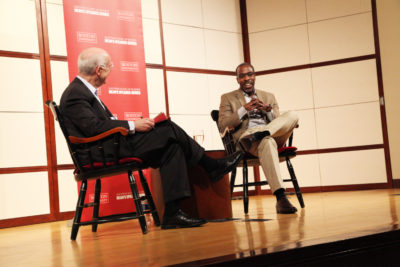
As hackers grow bolder in their attacks on corporations and infrastructure, the demand for superior cybersecurity intelligence and support has grown worldwide.
Last Wednesday night, Kenneth Freeman, dean of the Questrom School of Business, sat down with Corey Thomas, the CEO and president of the global cybersecurity at Rapid7, to discuss the growing importance of cybersecurity.
“People are creating new technologies, new innovation, and they cannot manage the innovation they are creating without fully maintaining their IT systems and that dynamic is creating a massive backlog of risk, vulnerability and exposure,” Thomas said.
Thomas explained how Rapid7, a cybersecurity company specializing in making company’s IT infrastructure more secure from data breaches and hacks, addresses those challenges.
“[At Rapid7], we are going to provide the intelligence and automation that is necessary to allow companies to not have to worry about the management and the maintenance of their technology environment and infrastructure” Thomas said. “We provide not just the data, not just the memory, but we provide the core intelligence and infrastructure.”
Thomas added that identifying a system’s vulnerable points is one of the most important elements of cybersecurity.
“We help companies identify what’s exposed and what’s vulnerable,” Thomas said. “Part of the challenge is that hackers have a better understanding of where companies are exposed than the companies themselves. If you are not aware you can’t fix it.”
Thomas said speed is also key to minimizing damage.
“We have technology that uses advanced analytics to detect attacks so that we can detect hackers when they are in the environment,” Thomas said. “The faster you can detect the hacker the less damage they can do.”
Speaking about his path to Rapid7 and the cybersecurity industry, Thomas said his parents greatly influenced his journey.
“[My parents and I] had this idea that we could go out and through hard work and through learning, we could actually create a better life than what our parents had lived,” Thomas said. “We had this sense of hope and optimism about the world and our potential in the world to come. This hope and optimism still stays with me today.”
His mother, Thomas said, introduced him computers, launching his passion for technology.
“One of the things that ended up really changing the trajectory of my path was that [my mother] had a friend who introduced me to computers,” Thomas said. “That just opened up a whole new world for me, a world of curiosity.”
Freeman said that he invited Thomas to speak after reading about him in The New York Times and thought he had an important lesson to share with the BU community.
“We felt that this [discussion] was not only appropriate for business students — we like this speaker series to be relevant for across the university — but an opportunity for students to learn what it means to be a leader and to think about what to do after getting a BU education,” Freeman said.
Travis Roache, a graduate student in Questrom and a business operations manager at IBM, said Thomas’ professionalism and diverse perspective compelled him to attend.
“I am a [professional evening MBA student], and I haven’t really been to any of these dean’s speaker series, so I just really wanted to attend, especially with such a high-profile speaker coming to campus and especially a person of color, which, I feel that hasn’t been as represented on the campus,” he said.
Jin Borjigin-Zhang, a sophomore in Questrom, said he wanted to learn more about cybersecurity in light of the recent Equifax hack.
“I personally am not really informed on this information but I do read the news so I know what is going on,” Borjigin-Zhang said. “Equifax was really shocking to everyone, so I came to get some insight on the field.”
Toward the end of the night, Thomas advised students to abandon traditional notions of success in a rapidly evolving world.
“The world is changing,” Thomas said. “My advice is to let go of the success recipe. Can you access both your creative potential as well as your operational potential?”



























































































































Nate W. • Oct 10, 2017 at 10:15 am
Good article. Wanna meet the author some day seems like a good kid.